Eid retail rush: A shopper’s guide to Dhaka
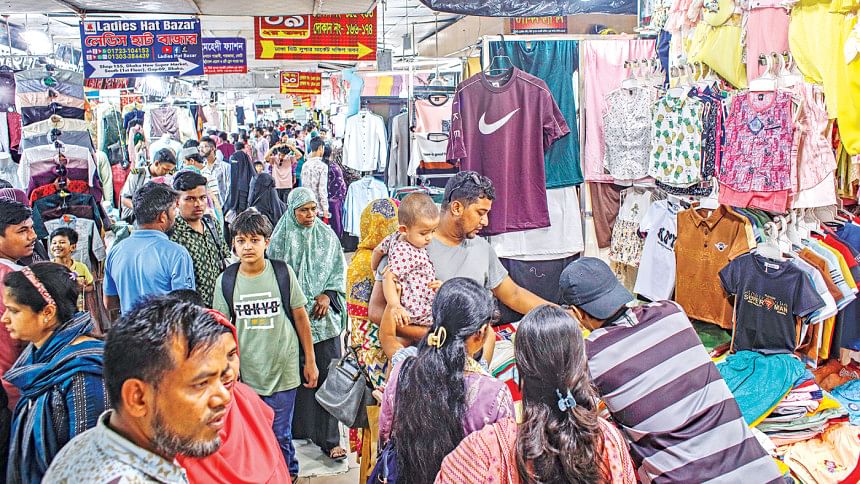
Who is crazy enough to go window shopping at this time of the year? I mean during the month of Ramadan, and that too in a cosmopolitan like Dhaka.
Well, I am guilty of affirming that this is one of my favourite festival leisure pursuits.
Not that I love being stuck in traffic, but the joy, I find in going through racks of clothes in new designs, checking out the play of colours in trend and the stark contrasts, perfectly blending in with the intricate artistry of handiwork, is euphoric.
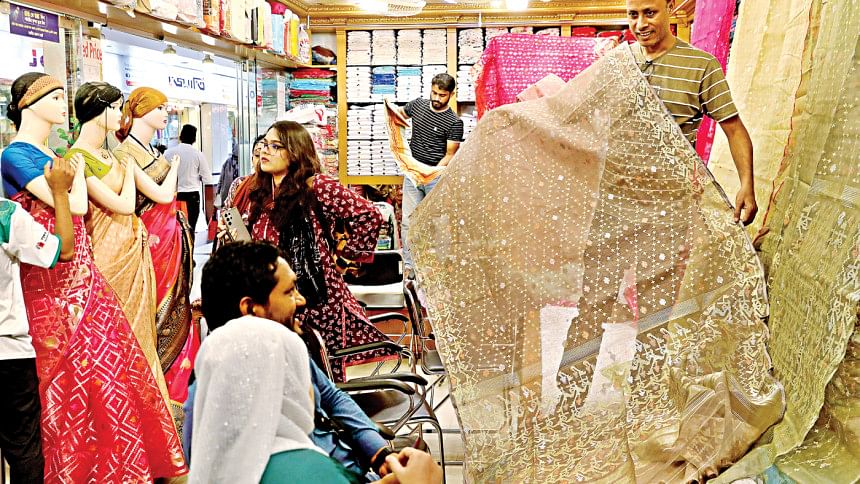
Be it the stacks of silks, satin, velvet, and laces in Islampur, imported dresses in Chandni Chawk or just picking gifts from thrift stores, my friends and I have done it all within the first ten days of Ramadan.
Ramadan is when every cranny of this city witnesses people opting for some sort of brisk festival business. They put up their trademark blue plastic canopy stuck on two poles by the roadside or sit on a spread-out blanket on the pavement offering an array of random items from green cardamom to prayer beads. The convenience item list can be that motley.
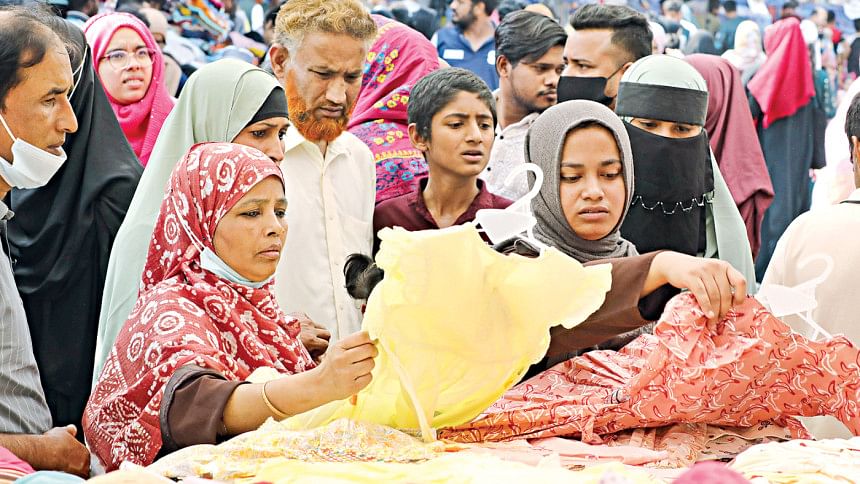
And not to forget the parked vans loaded with clothes stationed by any busy intersection. Practically in any free space, they set up their pop-up stores, with no regards to traffic norms.
Shirts, tees, socks, scarves imitation jewellery, bed sheets, home décor accessory, kitchen essentials, and crockery, you find every item on your wish list in these street set-ups, just as much in quality as in the malls.
"I got a set of teacups for my mother, and a set of stoneware dessert bowls for my mother-in-law from a van parked near Rajlakkhi in Uttara," says Alfie Hossain, who works in that vicinity but goes to her husband's home in Narayanganj during weekends and holidays.
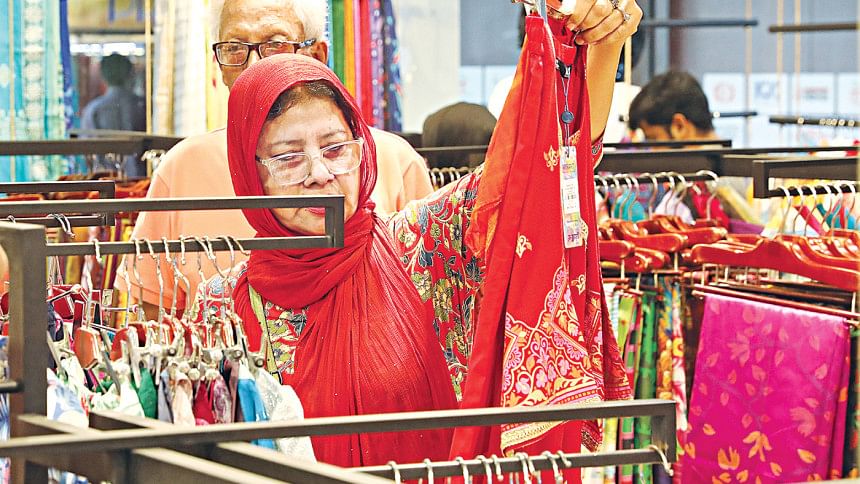
"The black zari embroidery Sharara set (an Indian pant dress) that I got from these lanes was a good bargain, the same dress in any other mall would have cost me half of my bonus. And on top of that I got gifts for all my family members," she continues.
Agreeing with what Alfie said I too felt that walking by these alleys and going through these beautiful and easy-on-the-wallet items, you will find great Eid gifts and nick-nacks. Roadside shopping has seen a sharp rise on the city streets and is at its peak now during Eid. Uttara, Dhanmondi, and Mohammadpur are just a few areas where street shopping from carts is making waves.
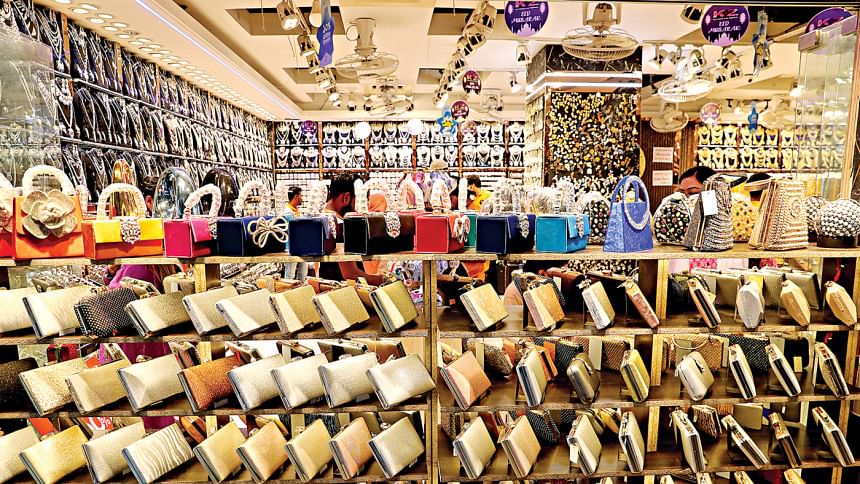
"I was looking for Eid gifts for the children living in my backstreet. They are the kids of the caretakers of apartments in my lane and my husband and I have a cute rapport with them all. We are extremely fond of the cheery band of tiny boys and girls. I was looking for a red Panjabi with mirror works, a red sandal shoe, and a tupi of a similar shade for my own mischievous 'Puck'; Zunaid a three-year-old who lives in the garage next door. His antics delight me to no end and Eid gifts for him were first on my list," says Paula Aziz a resident of Mohammadpur and an ardent fan of its town hall bazaar.
Panjabi shopping is the main highlight of the season, be it buying yards from Islampur and making be-spoke ones to opting for high-end brands like Aarong, Kumudini, Aranya, et all. Personally, I am sold to Kumudini for Panjabis, they have the widest range of cotton, silk, and khadi ones with intricate hand embroidery.
"Kumudini's starched cotton white Panjabi with Gila or creased sleeves are one of a kind in Dhaka. This lost technique of using the hard and flat 'gila' fruits to crease the sleeves of their Panjabi adds an extra touch of nobility to your Eid Kurta and is only done by this traditional handicraft store," Aziz adds saying that her family is a band of boys, and Panjabi shopping for them is a must-do Eid ritual in her house.
"No Eid is complete without purchasing saris," smiles Roza Islam of Dhanmondi. "Come Eid, I always drop by these stores in New Market to see their collections. I will also get some panjabis for my son and nephews."
One of my Eid window shopping lanes is Bailey Road and popping in all the Tangail sari stores is a matter of priority. Tangail taant sari is the best choice of festival wear for an Eid that falls in the Bengali month of Chaitra. Their white or any pastel shade of soft handloom sari with a woven border is elegant beyond words. Tangail Saree Kutir is the favoured handloom saree store in town.
This time I went looking for traditional Rajshahi silk sari in vegetable dyes and batik work. The exquisite silk yarns of full silk, half silk, endi silk, and raw silk make for beautiful festive dresses, shalwar kameez, sari, and kurtas. For men, the age-old fashion staple of the seventies and eighties -- the cream raw silk half-sleeve shirts, should make a comeback. I think it makes for an exclusive gift for your special one. Sopura Silk on Gulshan Avenue and Doyel Silk in Dhanmondi are your go-to shops for cent percent deshi silk besides their regular panjabi.
The posh malls of the city housing local boutiques and imported wear are all fine too. I walked the entire Chandni Chawk shopping block on the first Friday noon of Ramadan and found it to be stocked with imported wear.
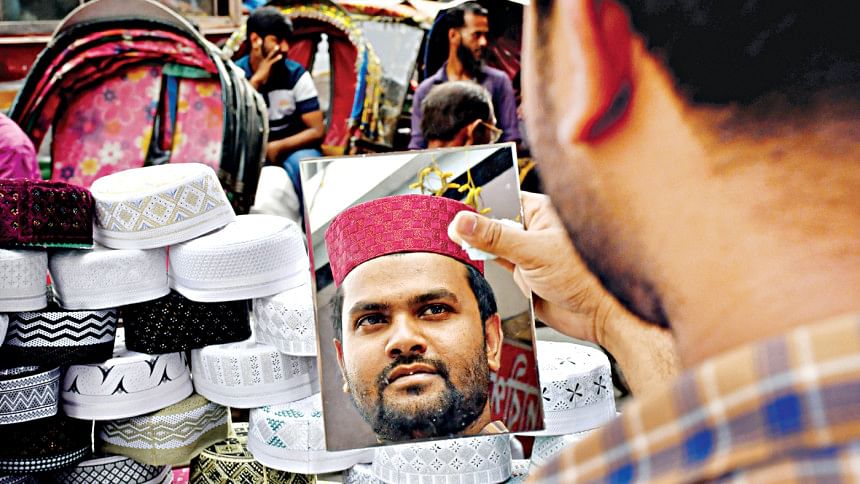
But on the contrary, I was happy to see the local spinoff and copy designs of these foreign wears. I mean sweat shops in Keraniganj and Mirpur are doing great jobs in sustaining the local garment businesses. Replicating the designer wears to the dot and bringing the price down for mass purchase is a job well done. I found a beautiful burgundy georgette shalwar kameez with intricate zari and kamdani work that is hard to distinguish from the master copy of imported overpriced dresses.
After all, what is Eid without designers' wear, and that too a local bespoke one? However, instead of opting for an imported copy, go for local designer wear. My earnest request to Dhaka is to please do your shopping from local heritage, and designer wear stores. Make the slogan "Deshi First, Deshi Always" the headline of your shopping list this festive season.
Celebrate traditions the traditional way.

 For all latest news, follow The Daily Star's Google News channel.
For all latest news, follow The Daily Star's Google News channel. 



Comments